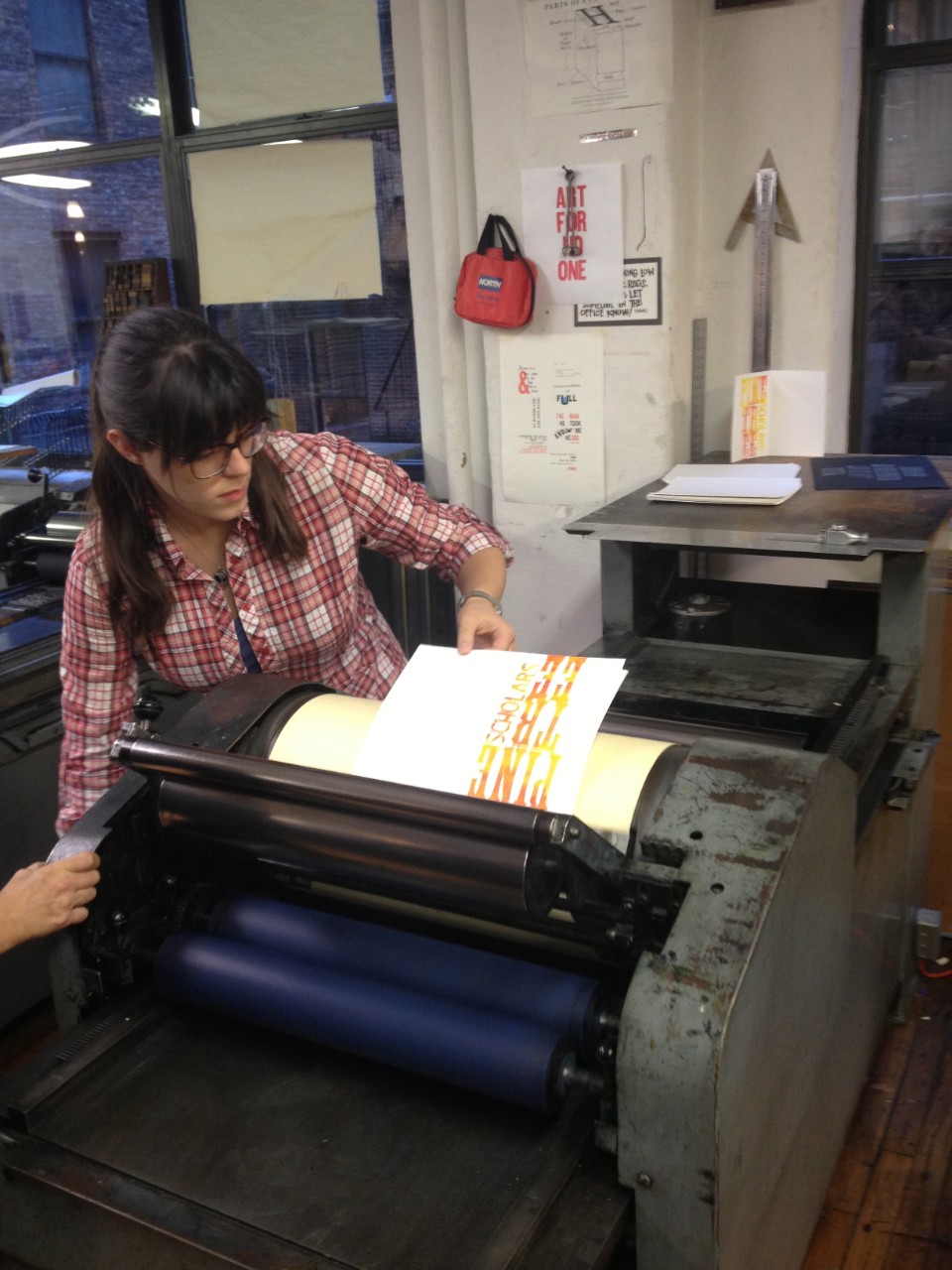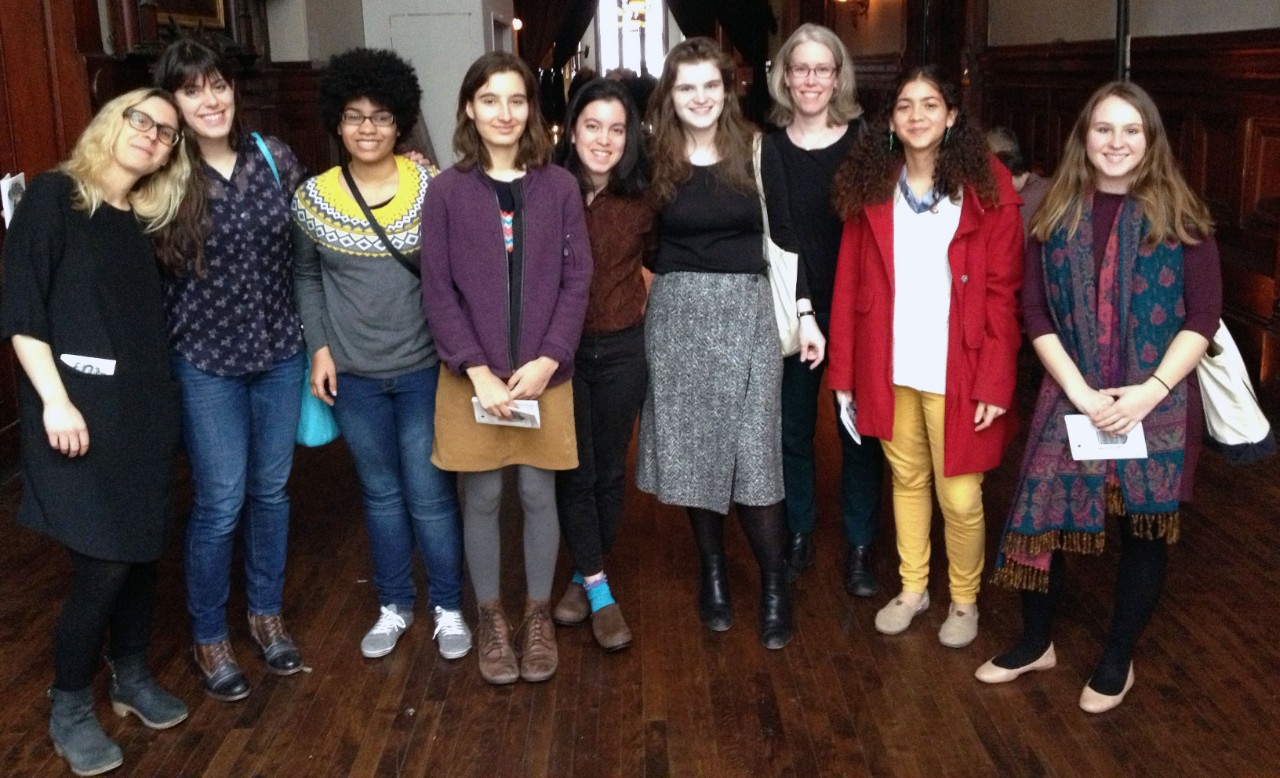Tangible Training: Students Explore Book Production
There is certainly no shortage of books at Columbia University. Butler Library alone houses more than two million print volumes, only a fraction of the total physical holdings in the Libraries. It is rare, though, to examine a book as a physical object, beyond employing it as a tool for answering research questions. However, the production of a book is an artistic endeavor and a select group of students are able to explore the intricacies of book production through the Columbia/Barnard Pine Tree Scholars program.
 Pine Tree participant Olivia Rutigliano pulls a print at the Center for Book Arts in Manhattan.
Pine Tree participant Olivia Rutigliano pulls a print at the Center for Book Arts in Manhattan.
Named for the foundation that supports its programming, the Pine Tree Foundation, Pine Tree Scholars began in the spring of 2013 under the leadership of Karla Nielsen, Curator of Literature in the Rare Book & Manuscript Library. Nielsen organized a single event – a visit to the New York Antiquarian Book Fair with 12 students – as a trial run prior to the year-long program planned to begin the following semester.
The Pine Tree Foundation was founded by the late Frank Tanenbaum, a book collector, and is currently directed by his widow, Szilvia Szmuk-Tanenbaum, a former rare book librarian.
“Frank and Szilvia hoped to encourage an interest in books as artifacts through their foundation,” said Nielsen. “The goal for our program was to find students who might have an interest in book production and rare books both academically and as a hobby, and to create an extracurricular program that would be fun and social as well as educational. Knowing that Columbia is an intense academic environment, Szilvia didn’t want us to create a program that would be one more academic obligation for its participants.”
Instead, Pine Tree Scholars offers a balanced combination of hands-on tutorials in fine book production and introductions to the rare book trade, taking full advantage of the creative arts in New York City. Now, three years since the program began, activities include a stop at the Bibliographical Society of America’s Young Scholars lectures on the Upper East Side and a visit to Woodside Press, a letterpress printing studio in the Brooklyn Navy Yards, to learn typesetting.
“I loved how [Pine Tree Scholars] gave me an introduction to a world I wouldn’t have otherwise known about,” said Yadira Capaz BC ’17, a 2015-2016 participant in Pine Tree. “As much as the making element is what we’re there for, I think I learned much more by seeing places and meeting people dedicated to the mastery of this craft.”
The development of Pine Tree programming, a joint effort by Nielsen, Teresa Harris, Curator of Avery Classics in Avery Architectural & Fine Arts Library, and Shannon O’Neill, Associate Director of Archives and Special Collections at Barnard College, loosely follows the trajectory of book production, surveying papermaking and bookbinding as well as modern technology relevant to publishing, like 3D printing and graphic design.
“The programs each year feel really fluid in their progression and because of this, the connections that I see students make between stages of book production or old and new technologies come more naturally,” said O’Neill. “It’s fun for us to see those ‘aha!’ moments, when you can tell that a student is beginning to piece it all together.”
Participation in Pine Tree Scholars is limited to 12 to 15 applicants each year. Though the content of the program certainly appeals to students in the arts and humanities, Pine Tree applicants represent a range of academic disciplines and extracurricular interests.
“[Pine Tree] seemed like the perfect culmination of my interests in art and literature,” said Chantal McStay ’15CC, a 2013-2014 participant. “I have always been interested in bookmaking and printing processes, and this sounded like a fantastic opportunity to learn more in a hands-on way.”
For many, the programming complemented their academic work, supplementing studies in creative writing, English, literature, and visual arts.
“I am a literature scholar, and I have a strong interest in material culture and bringing material practices into my classroom teaching,” said Arden Hegele ’16Ph.D., currently a Mellon Postdoctoral Fellow in the Humanities at Columbia and a 2013-2014 participant in Pine Tree. “I was very excited about the opportunity to study bookmaking practices for myself [through Pine Tree], since I knew it would give me greater insight into material technologies of literature from different historical eras.”
Pine Tree Scholars deepens students’ relationship with the Libraries as well, encouraging participants to engage with the University’s archives and special collections.
“[B]ecoming intimately connected with activities at the Rare Book & Manuscript Library is, to my mind, an excellent opportunity for building community among undergraduate students,” said Hegele. “[F]rom what my own students tell me anecdotally, [they] are much more likely to enjoy and use the library system in general after they have participated in programs like Pine Tree Scholars.”
The interests cultivated through Pine Tree Scholars often continue long after the conclusion of the program, contributing not only to students’ coursework, but extending beyond Columbia’s classrooms to professional careers in academia and publishing.
“This program was an incredible introduction to the world of independent publishing and has been a great resource in my current editorial work at an art magazine in Brooklyn,” said McStay. “I think [Pine Tree] is crucial in the way it brings together students and faculty who love books and exposes scholars to a wealth of literary resources on campus and around the city.”
Some lessons learned – those singular ‘aha!’ moments – may even lead students to look at something as familiar as a book a bit differently.
“To see a commonplace thing through new and knowledgeable eyes is a gift,” said Capaz. “This program allowed me to build a deep appreciation for books that built on my existing appreciation for their content. I think more students should have their mind opened like that.”
For more information about the Columbia/Barnard Pine Tree Scholars program, please visit library.columbia.edu/locations/rbml/exhibitions/pine.html.
